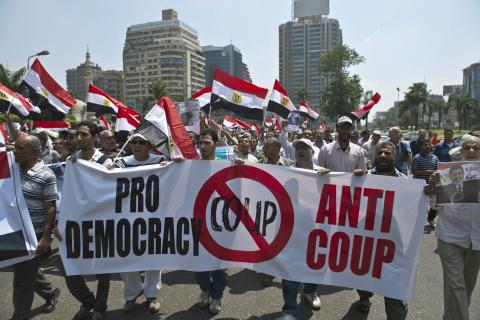But, for he knew his title not allowed,
Would keep him still depending on the crowd;
That kingly power, thus ebbing out, might be
Drawn to the dregs of a democracy.
—John Dryden, “Absalom and Achitophel” (1681)
For John Dryden, and just about everybody else in the 17th century, “democracy” was a dirty word. It had about the same connotation then as words like “anarchy” and “mob rule” have today, and all Dryden had to do to discredit the plots of his enemies was suggest that they might have been democrats.
The word didn’t sound much better in 1788, when James Madison and Alexander Hamilton wrote The Federalist Papers. Though both men knew perfectly well that the new government would include elements of classical democracy, they avoided the word whenever possible, emphasizing that America would be a “federal republic” rather than a raucous democracy.
Some time between then and now,” democracy” became a god-term for Americans. Not only do we want to make sure that we have one at home, we have taken it upon ourselves to make the world safe for it abroad. It was one of our primary exports during the 20th century, and establishing democracy in the Middle East was perhaps the major reason for the invasion of Iraq that did not involve (non-existent) weapons of mass destruction.
But here’s the problem: in contemporary American usage, “democracy” is not a word. It is two different words, representing two completely different ideas, that just happen to be spelled the same way. And we cannot design a rationale foreign policy in the Middle East without acknowledging that the two things that we mean by “democracy” are—or at least have a strong tendency to be—mutually exclusive in that part of the world.
The first “democracy,” let’s call it democracy(1), is a method of counting votes. Democracy(1) means that major political decisions are made through a plebiscite in which most or all citizens are eligible to participate. Whichever candidate, policy, or proposition gets the most votes wins the election. When people say that Mohamed Morsi was “the first democratically elected president Egypt,” they are talking about democracy(1).
But when Americans say that we want to make democracy spring up in the Arab world, we are talking about democracy(2), which means something like “a government that protects individual rights, freedom of religion, freedom of speech, the rights of minorities, and all of the other freedoms and procedural safeguards that Americans usually take for granted.” A country that is committed to democracy(2), then, is a country that is, within one order of approximation, like us. Ironically, most of the democratic(2) advances in the Middle East have been accomplished by unelected strongmen who could be bribed and bullied by Western nations into liberalizing their countries.
And this brings us to Egypt, where Morsi, who was very clearly elected by democracy(1), did virtually nothing to establish democracy(2). Americans always seem so surprised when this happens, but we shouldn’t be. There is no particular reason that the majority of people in a country will want things like freedom of speech and freedom of religion—much less the protection of minority rights. Quite the reverse: when a permanent majority emerges in a country governed by democracy(1), it will almost always do everything possible to make sure that the minority never has the level of protection provided by democracy(2).
James Madison knew this very well, and he says it rather plainly in Federalist #10. “When a majority is included in a faction,” he writes, “the form of popular government . . . enables it to sacrifice to its ruling passion or interest both the public good and the rights of other citizens.” Madison understood that the most important test of a republican government was whether or not it could keep this from happening.
And Madison understood that the only way to prevent majoritarian tyranny in a free republic is to prevent any single faction from attaining a permanent majority. But if we look at the places that America has recently tried to plant the flag of democracy(2), we see that they almost always come with built-in permanent majority factions: Shia Moslems in Iraq, ethnic Pashtuns in Afghanistan, and though it remains to be seen, quite possibly Islamists in Egypt.
Madison’s greatest lesson to the world is that, when a single political faction becomes a permanent majority, democracy(1) cannot produce democracy(2). But we keep forgetting. In country after country we keep thinking that we can bring about a liberal political state by the simple expedient of setting up a system for counting votes. Underlying this belief is the sincere, but profoundly incorrect assumption that people who are allowed to vote will vote to be like us.
